 alt="Puer Surrounding Counties and Towns: Weekly & Special Local Markets Travel Guide"
/>
alt="Puer Surrounding Counties and Towns: Weekly & Special Local Markets Travel Guide"
/>
Jianchuan County Dining
When come to Jianchuan, you can’t miss "Eight Bowls". The “Eight Bowls” used in the weddings or funerals is the concentrated reflection of the traditional cooking culture of Bai People. The old fashioned square table for eight people (carved marble square table) takes eights dishes, known as “Eight Bowls”. The Eight Bowls of Bai People has appropriate collocation of meats and vegetables, fat but not greasy, plain but not light, with rich nutrition. Covering fry, crisp, stewing and boiling, with colorful brightness, extruding vinegar-pepper flavor of the diet of Bai People.
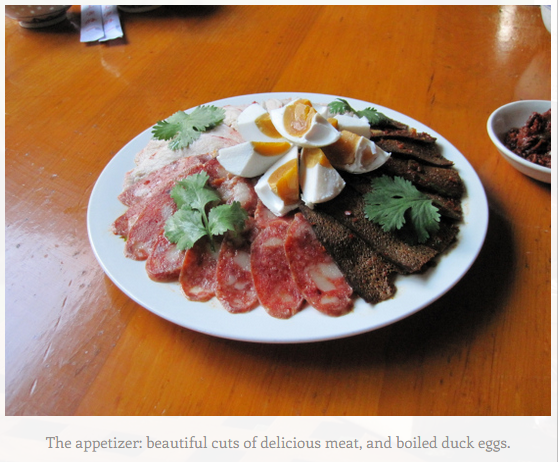
The first plate, which is a sort of appetizer. It is an amazing plate of what we Westerners might call charcuterie: assorted slices of meats, served with boiled duck eggs. The meats include beef, pork, and liver. They are all simply brilliant: each variety of meat burst with rich, intense meaty flavor, complemented with a dash of exotic spices.
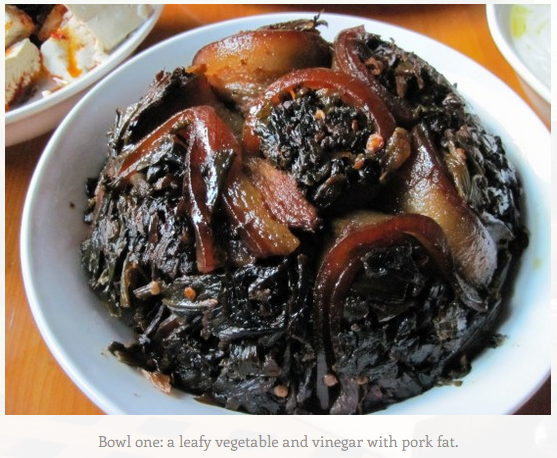
The first bowl is pickled Chinese cabbage with fatty pork. This is one of the best dishes I have ever had. It consisted basically of Chinese cabbage and spices pickled in a rich, dark rice vinegar, along with the pork. The flavor is profoundly sour and tart, with a complex bitter undertone. The cabbage alone would have been too intense for most people, but the luscious, fatty pork balance the sourness with rich, salty meat. The flavor is extremely complicated and complex, with a richness that is only found in the most aged Western cheeses.
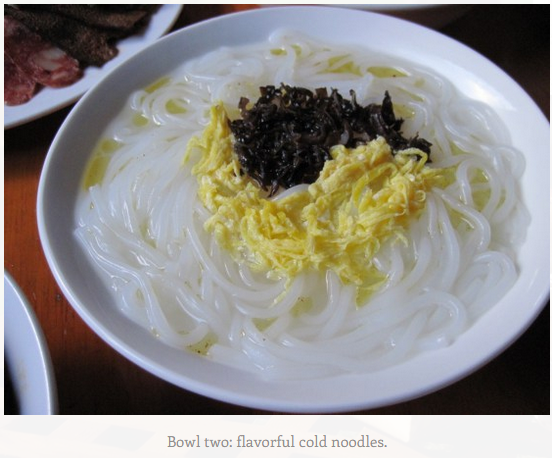
The second bowl is a dish of cold rice noodles with boiled egg yolks and wood ear mushrooms. The flavor is delicate, with a hint of white vinegar, the richness of the egg yolks, and the earthy, woody flavor of the mushrooms. I think this dish as a sort of palate cleanser for the pickled pork dish.
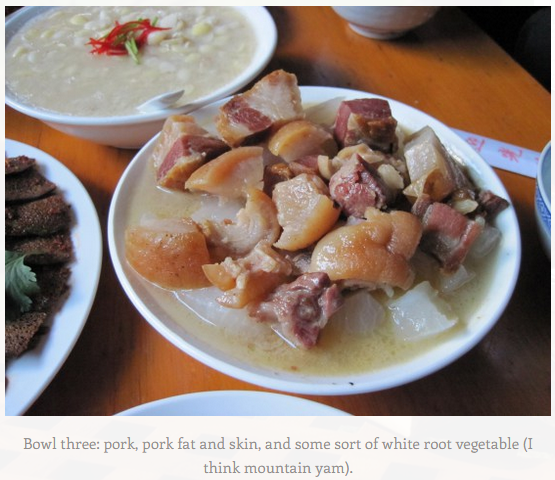
The third bowl is mountain yam in a flavorful broth, topped with — you guessed it — fatty pork. But lest you imagine the pork to have been overwhelming overkill, keep in mind that the Chinese people are the greatest butchers in the world: they know a pig’s body like no one else, topping even the French in using literally every part of a pig’s body for food. So although several dishes involve pork, each dish has its own cut of the pig that is perfectly suited to that dish. The pork in this dish is rich, but not overly organic in flavor, perfectly suiting the thick mouthfeel of the mountain yam.
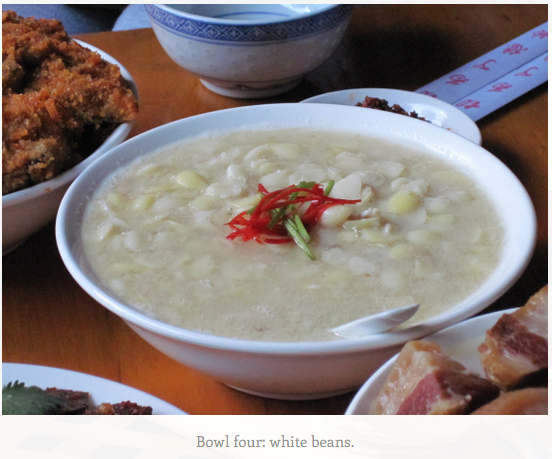
The fourth bowl is a dish of local white beans, flavored with chives and mild red peppers. The texture is thick and milky, but the beans are overcooked. In fact, they had a perfect balance of smoothness and crispness. The flavor is warm and full-bodied. The beans themselves have a crisp but earthy element.
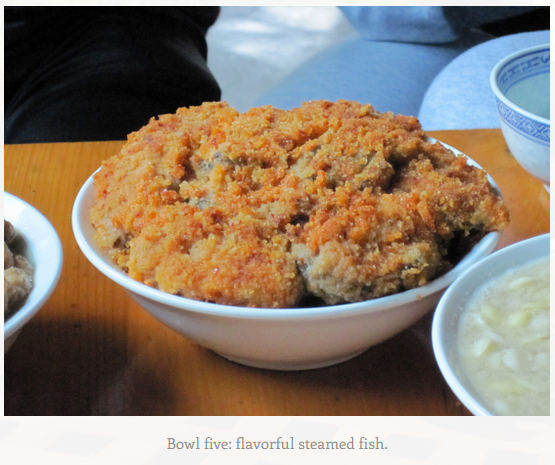
The fifth bowl is full of flavorful river fish, topped with a flour breading. The flavor is very nice: like fresh, crisp river sweetness, with the fuller flavor of the breading, and a mixture of garlic and other spices.
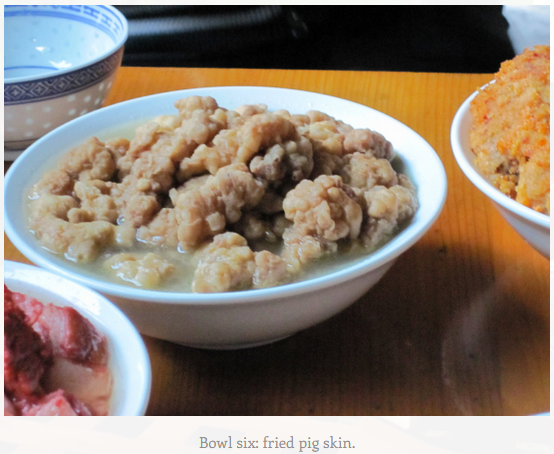
The sixth bowl is fried pig skin(酥肉). This dish is, without a doubt, the richest, fattiest, most succulent and luxurious dish. But despite what you might imagine, it is not at all greasy or oily. Rather, it is soft and tender.
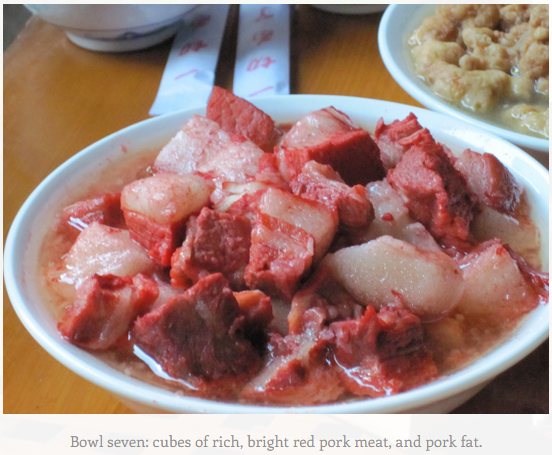
The seventh bowl (pork again!) is cubes of pork with a very substantial texture, along with pieces of pork fat. Remember though that every dish has a different cut of pork suited just for that dish. This particular cut of pork is meaty and thick, but still tender. Because of the bright pink-red color of this pork, the meat is partially cured before it is stir-fried. The flavor bore my theory out. Besides preservation, meat is cured to greatly concentrate and intensify the flavor. The bright pork flavor in this dish is extremely concentrated, the very spirit of pig flavor.
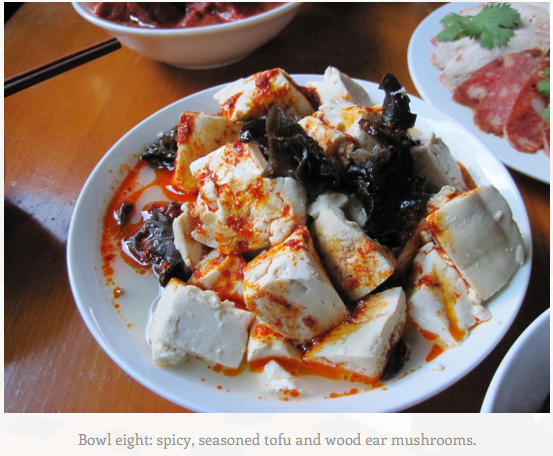
The eighth and final bowl is light, fluffy tofu with wood ear mushrooms and a spicy red chili sauce drizzled on top. The flavor combination of these three ingredients is masterful. The soft, mild tofu and the full-bodied earthiness of the mushrooms are accented by the piquancy of the chili oil.

 7 Days GolfingTour
7 Days GolfingTour
 8 Days Group Tour
8 Days Group Tour
 8 Days Yunnan Tour
8 Days Yunnan Tour
 7 Days Shangri La Hiking
7 Days Shangri La Hiking
 11 Days Yunnan Tour
11 Days Yunnan Tour
 6 Days Yuanyang Terraces
6 Days Yuanyang Terraces
 11 Days Yunnan Tour
11 Days Yunnan Tour
 8 Days South Yunnan
8 Days South Yunnan
 7 Days Tea Tour
7 Days Tea Tour
 8 Days Muslim Tour
8 Days Muslim Tour
 12 Days Self-Driving
12 Days Self-Driving
 4 Days Haba Climbing
4 Days Haba Climbing
 Tiger Leaping Gorge
Tiger Leaping Gorge
 Stone Forest
Stone Forest
 Yunnan-Tibet
Yunnan-Tibet
 Hani Rice Terraces
Hani Rice Terraces
 Kunming
Kunming
 Lijiang
Lijiang
 Shangri-la
Shangri-la
 Dali
Dali
 XishuangBanna
XishuangBanna
 Honghe
Honghe
 Kunming
Kunming
 Lijiang
Lijiang
 Shangri-la
Shangri-la
 Yuanyang Rice Terraces
Yuanyang Rice Terraces
 Nujiang
Nujiang
 XishuangBanna
XishuangBanna
 Spring City Golf
Spring City Golf
 Snow Mountain Golf
Snow Mountain Golf
 Stone Mountain Golf
Stone Mountain Golf



 What Our Customers Say?
What Our Customers Say?
